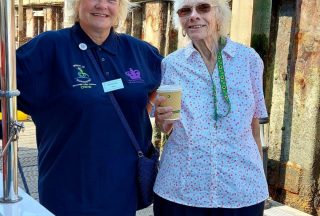Dorset residents who are caring for someone have been sharing their experiences and views in a survey carried out by local charity Carer Support Dorset.
Many are caring for long hours, including during the night, according to the results, and an overwhelming message was that unpaid carers need better and easier access to respite.
Over 65% of respondents are dedicating more than 50 hours a week to their caring responsibilities. These responsibilities include those most associated with caring, such as cooking, administering medication and helping someone to get dressed, but often involve many other things too – shopping, cleaning, organising finances, DIY and gardening, advocating for someone and providing emotional support.
Key findings include:
- 98% of respondents say they feel stressed about their caring role, with nearly one in five saying they permanently experience stress.
- 88% say they feel mentally exhausted.
- 45% say they feel they have lost control of their lives.
- 65% feel their caring role limits their choices about the future.
- Over a third of respondents have experienced physcal or emotional harm from the person they care for.
- 25% say they are struggling to meet basic living needs and nearly half expressed concerns about their long-term financial situation.
In terms of how support could be improved for those who are caring for someone in Dorset, the overwhelming response was that carers would like better and easier access to respite.
71% feel that community services are not meeting their needs and over 50% don’t get a regular short break from their caring role.
Nearly 60% are never or only sometimes happy with professional support provided by paid carers and respite services.
Leanne Hubbard is Chief Executive of Carer Support Dorset. She said:
“When we talk to carers we’re hearing about how much more many are doing, so we know the demand on them is increasing. At Carer Support Dorset we are increasing the services we run to support carers’ wellbeing – for example in the last few months we have started to run carer cafes in Bridport and Wareham and support groups in Gillingham and Blandford to give carers places they can speak to other carers and to a trained advisor who can point them to support. We run regular free training for carers covering topics such as mental health. As part of the carer poverty coalition we are campaigning for the Government to provide targeted support to unpaid carers by reforming the benefits system to better support carers, raising the level of Carer’s Allowance and increasing the earnings limit.
“We hear the challenges with respite and finding good paid care, which is an issue across the country. Carer Support Dorset will continue making sure carers’ voices are heard, be advocates and push for improvements in these areas. Despite the challenges this survey exposes, 97% of respondents said they feel they have a positive impact on the person they care for. But we need carers to be able to make this huge positive difference without a detrimental cost to themselves.”
The Dorset Carers Partnership Group (DCPG) is a consultative group and voice for carers made up of practitioners and organisations that support unpaid carers and work together with carers to address challenges in practice, raise awareness, co-produce information, advice and guidance and drive equality across the geographical footprint.
DCPG Chair Eliza Atyeo says: “It is well known that carers struggle to access respite for a range of reasons, which in turn can affect their ability to maintain a life alongside caring. The 71% of carers feeling that community services are not meeting their respite needs echoes a similar survey from BCP Council in 2022 that found accessing respite was one of the three most challenging parts of the caring role, alongside finances and knowing what services were available.
“The DCPG are dedicated to identifying ways to close the gap, therefore, we are looking to initiate a task finish group with the purpose of scoping the current provision of respite for carers in the local area to identify gaps in the system. From there we can look to co-ordinate this information to make the process of finding services easier for carers. Then we can work with carers, stakeholders and partners to identify ways we can improve provision across Bournemouth, Christchurch, Poole and Dorset as a whole.”



